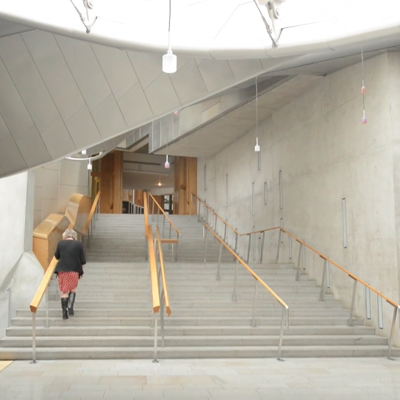Public policy highlights March 2022
Our policy committees have had a busy month analysing and responding to proposed changes in the law. We do this to positively influence the creation of a fairer and more just society through our active engagement with the Scottish and United Kingdom Governments, Parliaments, wider stakeholders and our membership.
You can read more about this month's highlights below:
Scottish Government not proven verdict and related reforms consultation
The Law Society of Scotland’s Criminal Law Committee responded to the Scottish Government’s not proven verdict and related reforms consultation, stating its opposition to the abolition of the third verdict. Addressing the view that conviction rates in sexual offence cases are too low and suggestions that if the third verdict was not available, jurors would opt for a guilty verdict, the Society argues that if too few guilty people are being convicted, it is more likely to be due to a lack of evidence rather than a fault with the system itself.
It states that manipulating the justice system to increase conviction rates is a very dangerous path for any government to go down and inevitably risks miscarriages of justice. It welcomes work currently underway to improve understanding that there is not one uniform and authentic reaction to sexual crime and develop an appropriate approach in sexual offence cases. This specialist targeted work, it claims, will be more effective in addressing the sensitive issues in sexual offence cases than, removing the not proven verdict – which would impact all cases across the whole of the criminal justice system. The Society notes that the abolition of the not proven verdict represents the removal of an important safeguard. In the Scottish criminal justice system where a simple majority can result in life imprisonment, maintenance of this fundamental protection is vital.
The Society’s response also addresses the timing of the consultation, arguing that the immediate focus for the criminal justice system should be to address the current backlog in the courts rather than attempt a fundamental change at a time when the system is emerging from the systemic shock of the pandemic.
Economic Crime (Transparency and Enforcement) Bill
A number of the Society’s committees considered this Bill which was passed on an expeditated timescale through the Parliament in light of Russia’s invasion of Ukraine. While the provisions of the Bill concerning the establishment of a Register of Overseas Entities had previously been consulted upon and were expected to be introduced at such time as the Parliamentary timetable allowed, the Bill also includes provisions amending existing legislation on unexplained wealth orders and on sanctions.
The briefings issued by the Society highlighted full support for the aims of the Bill in increasing transparency and for its provisions which seek to combat money laundering, corruption and terrorism, and deplored the use of legitimate business structures for criminal intent and purposes. It was noted that care should be taken, however, to avoid introducing measures which may impose a burden on legitimate businesses and commercial activities, but which may not effectively dissuade those businesses or individuals intent on criminal behaviour. The Briefings highlighted a number of practical considerations for the implementation of the Register of Overseas Entities by Companies House and the potential impacts on land registration in Scotland. The Bill received Royal Assent on 15 March 2022.
Land and Buildings Transaction Tax: Additional Dwelling Supplement
The Scottish Government held a consultation seeking evidence and views on the operation of the Land and Buildings Transaction Tax (LBTT) Additional Dwelling Supplement (ADS) as the first stage of their ADS review announced in the 2021-22 Programme for Government.
The Society’s Tax Law committee responded to the consultation noting that a number of issues have arisen with the application and implementation of the ADS which would benefit from resolution or clarification and encouraging the Scottish Government to use this opportunity to undertake a wide and detailed review of the operation of the ADS in Scotland with a view to improving the law.
It was noted that the law in this area is particularly complex and the response supported steps being taken to simplify both legislation and guidance relating to the ADS in order to make it easier for taxpayers and their advisers to assess liability. In particular, the response supported amending the length of time available to purchase a new main residence following the sale of a previous main residence and amending the length of time available to sell a previous main residence following the purchase of a new main residence, in both cases recommending that these time periods be brought in line with those under equivalent provisions in England and Wales.
The response also recommends changes to the law in connection with inherited property, cases of divorce or separation, and joint buyers, all with a view to resolving disproportionate impacts of the tax which can arise in certain circumstances.
Code of Practice for Continuing and Welfare Attorneys (Third Edition)
The Society responded to the Scottish Government’s invitation to comment on the draft third edition of the Code of Practice for Continuing and Welfare Attorneys. The draft proposed introducing separate sections for granters and attorneys, as well as a number of updates to the content of the Code.
The Society’s response welcomed the proposals to update the Code in order to achieve improvements in practice pending the outcome of the Scottish Mental Health Law Review. The response suggested that the information for granters and substantive Code of Practice should be published as separate documents with appropriate cross-referencing and signposting, and that consideration should be given to developing an additional simplified summary of essential points to improve accessibility. The response recommended a review of the structure of the Code prior to publication. The Society’s comments also emphasised the need for UN CRPD requirements to be built in throughout the Code of Practice.


